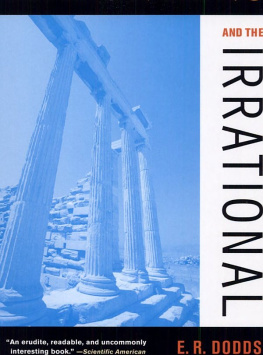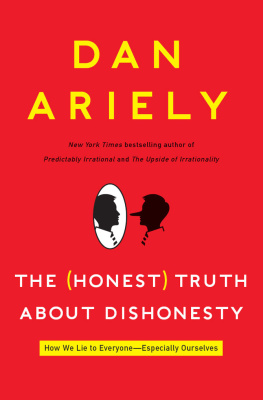E.R. Dodds - The Greeks and the Irrational
Here you can read online E.R. Dodds - The Greeks and the Irrational full text of the book (entire story) in english for free. Download pdf and epub, get meaning, cover and reviews about this ebook. year: 1962, publisher: University of California Press, genre: Science. Description of the work, (preface) as well as reviews are available. Best literature library LitArk.com created for fans of good reading and offers a wide selection of genres:
Romance novel
Science fiction
Adventure
Detective
Science
History
Home and family
Prose
Art
Politics
Computer
Non-fiction
Religion
Business
Children
Humor
Choose a favorite category and find really read worthwhile books. Enjoy immersion in the world of imagination, feel the emotions of the characters or learn something new for yourself, make an fascinating discovery.

The Greeks and the Irrational: summary, description and annotation
We offer to read an annotation, description, summary or preface (depends on what the author of the book "The Greeks and the Irrational" wrote himself). If you haven't found the necessary information about the book — write in the comments, we will try to find it.
The Greeks and the Irrational — read online for free the complete book (whole text) full work
Below is the text of the book, divided by pages. System saving the place of the last page read, allows you to conveniently read the book "The Greeks and the Irrational" online for free, without having to search again every time where you left off. Put a bookmark, and you can go to the page where you finished reading at any time.
Font size:
Interval:
Bookmark:


PREFACE
This book is based on a course of lectures which I had the honour of giving at Berkeley in the autumn of 1949. They are reproduced here substantially as they were composed, though in a form slightly fuller than that in which they were delivered. Their original audience included many anthropologists and other scholars who had no specialist knowledge of ancient Greece, and it is my hope that in their present shape they may interest a similar audience of readers. I have therefore translated virtually all Greek quotations occurring in the text, and have transliterated the more important of those Greek terms which have no true English equivalent. I have also abstained as far as possible from encumbering the text with controversial arguments on points of detail, which could mean little to readers unfamiliar with the views controverted, and from complicating my main theme by pursuing the numerous side-issues which tempt the professional scholar. A selection of such matter will be found in the notes, in which I have tried to indicate briefly, where possible by reference to ancient sources or modern discussions, and where necessary by argument, the grounds for the opinions advanced in the text.
To the nonclassical reader I should like to offer a warning against treating the book as if it were a history of Greek religion, or even of Greek religious ideas or feelings. If he does, he will be gravely misled. It is a study of the successive interpretations which Greek minds placed on one particular type of human experiencea sort of experience in which nineteenth-century rationalism took little interest, but whose cultural significance is now widely recognised. The evidence which is here brought together illustrates an important, and relatively unfamiliar, aspect of the mental world of ancient Greece. But an aspect must not be mistaken for the whole.
To my fellow-professionals I perhaps owe some defence of the use which I have made in several places of recent anthropological and psychological observations and theories. In a world of specialists, such borrowings from unfamiliar disciplines are, I know, generally received by the learned with apprehension and often with active distaste. I expect to be reminded, in the first place, that "the Greeks were not savages," and secondly, that in these relatively new studies the accepted truths of to-day are apt to become the discarded errors of to-morrow. Both statements are correct. But in reply to the first it is perhaps sufficient to quote the opinion of Lvy-Bruhl, that "dans tout esprit humain, quel qu'en sot le dveloppement intellectuel, subsiste un fond indracinable de mentalit primitive"; or, if nonclassical anthropologists are suspect, the opinion of Nilsson, that "primitive mentality is a fairly good description of the mental behaviour of most people to-day except in their technical or consciously intellectual activities." Why should we attribute to the ancient Greeks an immunity from "primitive" modes of thought which we do not find in any society open to our direct observation?
As to the second point, many of the theories to which I have referred are admittedly provisional and uncertain. But if we are trying to reach some understanding of Greek minds, and are not content with describing external behaviour or drawing up a list of recorded "beliefs," we must work by what light we can get, and an uncertain light is better than none. Tylor's animism, Mannhardt's vegetation-magic, Frazer's year-spirits, Codrington's mana, have all in their day helped to illuminate dark places in the ancient record. They have also encouraged many rash guesses. But time and the critics can be trusted to deal with the guesses; the illumination remains. I see here good reason to be cautious in applying to the Greeks generalisations based on non-Greek evidence, but none for the withdrawal of Greek scholarship into a self-imposed isolation. Still less are classical scholars justified in continuing to operateas many of them dowith obsolete anthropological concepts, ignoring the new directions which these studies have taken in the last thirty years, such as the promising recent alliance between social anthropology and social psychology. If the truth is beyond our grasp, the errors of to-morrow are still to be preferred to the errors of yesterday; for error in the sciences is only another name for the progressive approximation to truth.
It remains to express my gratitude to those who have helped in the production of this book: in the first place to the University of California, for causing me to write it; then to Ludwig Edelstein, W. K. C. Guthrie, I. M. Linforth, and A. D. Nock, all of whom read the whole or a part in typescript and made valuable suggestions; and finally to Harold A. Small, W. H. Alexander, and others at the University of California Press, who took great and uncomplaining trouble in preparing the text for the printer. I must also thank Professor Nock and the Council of the Roman Society for permission to reprint as appendices two articles which appeared respectively in the Harvard Theological Review and the Journal of Roman Studies; and the Council of the Hellenic Society for permission to reproduce some pages from an article published in the Journal of Hellenic Studies.
E. R. D.
Oxford
August 1950
I
Agamemnon's Apology
The recesses of feeling, the darker, blinder strata of character, are the only places in the world in which we catch real fact in the making.
William James
Some years ago I was in the British Museum looking at the Parthenon sculptures when a young man came up to me and said with a worried air, "I know it's an awful thing to confess, but this Greek stuff doesn't move me one bit." I said that was very interesting: could he define at all the reasons for his lack of response? He reflected for a minute or two. Then he said, "Well, it's all so terribly rational, if you know what I mean." I thought I did know. The young man was only saying what has been said more articulately by Roger Fry1 and others. To a generation whose sensibilities have been trained on African and Aztec art, and on the work of such men as Modigliani and Henry Moore, the art of the Greeks, and Greek culture in general, is apt to appear lacking in the awareness of mystery and in the ability to penetrate to the deeper, less conscious levels of human experience.
This fragment of conversation stuck in my head and set me thinking. Were the Greeks in fact quite so blind to the importance of nonrational factors in man's experience and behaviour as is commonly assumed both by their apologists and by their critics? That is the question out of which this book grew. To answer it completely would evidently involve a survey of the whole cultural achievement of ancient Greece. But what I propose attempting is something much more modest: I shall merely try to throw some light on the problem by examining afresh certain relevant aspects of Greek religious experience. I hope that the result may have a certain interest not only for Greek scholars but for some anthropologists and social psychologists, indeed for anyone who is concerned to understand the springs of human behaviour. I shall therefore try as far as possible to present the evidence in terms intelligible to the nonspecialist.
1 For notes to chapter i see pages 18-27.
I shall begin by considering a particular aspect of Homeric religion. To some classical scholars the Homeric poems will seem a bad place to look for any sort of religious experience. "The truth is," says Professor Mazon in a recent book, "that there was never a poem less religious than the
Font size:
Interval:
Bookmark:
Similar books «The Greeks and the Irrational»
Look at similar books to The Greeks and the Irrational. We have selected literature similar in name and meaning in the hope of providing readers with more options to find new, interesting, not yet read works.
Discussion, reviews of the book The Greeks and the Irrational and just readers' own opinions. Leave your comments, write what you think about the work, its meaning or the main characters. Specify what exactly you liked and what you didn't like, and why you think so.









